| Reviews & Columns |
|
Reviews DVD TV on DVD Blu-ray 4K UHD International DVDs In Theaters Reviews by Studio Video Games Features Collector Series DVDs Easter Egg Database Interviews DVD Talk Radio Feature Articles Columns Anime Talk DVD Savant Horror DVDs The M.O.D. Squad Art House HD Talk Silent DVD
|
DVD Talk Forum |
|
|
| Resources |
|
DVD Price Search Customer Service #'s RCE Info Links |
|
Columns
|
|
|
Deadwood - The Complete Second Season
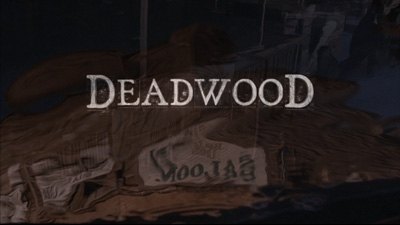
INTRODUCTION:
Set on the lawless edge of the American frontier in the Black Hills of South Dakota, the first season of Deadwood quickly established itself as one of the most richly detailed and compelling period pieces ever on television. David Milch's character-driven morality tale took us into the heart of this outlaw town and inside the dynamic personalities at its forefront, illustrating that no matter how much the residents wanted to be rid of government interference, they still desperately craved a level of order and a sense of community. With beautiful costuming and set design and an unmatched attention to visual detail, Deadwood created a setting so realistic and engrossing that it became difficult to separate dramatic presentation from historical record. HBO followed that inaugural effort by further developing the community's delicate growth with a season that is arguably stronger than the first, and it is presented here on DVD in "Deadwood - The Complete Second Season".
CONTENT:
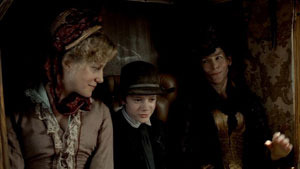 The year is now 1877, about six months after the end of the first season, and the leaders of Deadwood have achieved a level of stability in camp. Seth Bullock (Timothy Olyphant) has somewhat reluctantly agreed to assume the position of Sheriff, General Crook's (Peter Coyote) troops have moved along and will not be interfering with business, and Magistrate Clagett (Marshall Bell) has been taken care of, cementing Silas Adams' (Titus Welliver) loyalty to Swearengen (Ian McShane). That stability is short-lived, however, as undesired progress begins to make its way into town along with a few unexpected visitors. The hill country surrounding the area of Deadwood is being divided up by the Governor of the Dakota Territory, and the Yankton Commissioners assigned to control these new counties are going to cause trouble for Swearengen by encroaching on his business interests. Further irritating Al is the construction of telegraph lines, yet another indication that their little isolated corner of the wild frontier will be unable to maintain its relative autonomy for much longer.
The year is now 1877, about six months after the end of the first season, and the leaders of Deadwood have achieved a level of stability in camp. Seth Bullock (Timothy Olyphant) has somewhat reluctantly agreed to assume the position of Sheriff, General Crook's (Peter Coyote) troops have moved along and will not be interfering with business, and Magistrate Clagett (Marshall Bell) has been taken care of, cementing Silas Adams' (Titus Welliver) loyalty to Swearengen (Ian McShane). That stability is short-lived, however, as undesired progress begins to make its way into town along with a few unexpected visitors. The hill country surrounding the area of Deadwood is being divided up by the Governor of the Dakota Territory, and the Yankton Commissioners assigned to control these new counties are going to cause trouble for Swearengen by encroaching on his business interests. Further irritating Al is the construction of telegraph lines, yet another indication that their little isolated corner of the wild frontier will be unable to maintain its relative autonomy for much longer.
These political and economic issues are just the beginning of the changes facing the residents of Deadwood, for arriving on a stagecoach in the first episode of the season are two groups that will prove very important in the months to come. First is Maddie (Alice Krige), a Madame traveling with a group of whores intending to join Joanie Stubbs (Kim Dickens) in creating an up-scale brothel that will compete with Cy Tolliver's (Powers Boothe) Bella Union. More importantly, though, is Martha Bullock (Anna Gunn), the woman Seth dutifully married after the death of his brother, and with her, their young son William (Josh Eriksson). With Seth now firmly embroiled in an affair with the widow Alma Garret (Molly Parker), this premature arrival of a wife he doesn't romantically love and a son he barely knows sends his life into disarray.
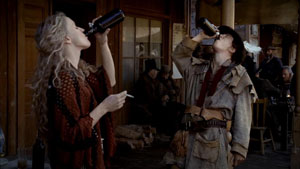 As if there weren't enough new additions to the cast already, one final new character arrives on the scene to complicate the lives of nearly everyone in the camp. Francis Wolcott (Garret Dillahunt) is an ice cold and ruthless agent of the famous mining magnate George Hearst, a man with whom no one wants to tangle, and the fact that Wolcott is nosing around town on his behalf portends some potential dark times for those who currently control the flow of profit in Deadwood. Dillahunt was amazing in the first season as the gutless Jack McCall, and for this second role on the show, he gets an extreme makeover and is once again brilliant with a completely different type of character. The matter-of-fact way he moves about the camp manipulating others toward his design is quite unsettling, and the more we learn about his motivations throughout the season, the better it gets.
As if there weren't enough new additions to the cast already, one final new character arrives on the scene to complicate the lives of nearly everyone in the camp. Francis Wolcott (Garret Dillahunt) is an ice cold and ruthless agent of the famous mining magnate George Hearst, a man with whom no one wants to tangle, and the fact that Wolcott is nosing around town on his behalf portends some potential dark times for those who currently control the flow of profit in Deadwood. Dillahunt was amazing in the first season as the gutless Jack McCall, and for this second role on the show, he gets an extreme makeover and is once again brilliant with a completely different type of character. The matter-of-fact way he moves about the camp manipulating others toward his design is quite unsettling, and the more we learn about his motivations throughout the season, the better it gets.
In addition to the new characters brought to the show, the second season also provides a chance for some of the underused characters of the first season to take center stage. Chief among these are Trixie (Paula Malcomson), who is still trying to find her way independent of Swearengen and who cannot hide from her maternal need to care for others, as well as Dan Dority (W. Earl Brown), Al's trusted first lieutenant. As great as everyone else is on the show, and there's no denying that McShane's Swearengen is one of the best characters in all of television, it is the lower profile performances of characters like these that add so much depth to the series and elevate it above most everything else on the air. Brown, in particular, is just amazing in the role of Dority. He doesn't just work for Swearengen; he loves him and depends on him. Unlike so many others, he is not simply biding his time waiting to take control with aims on power of his own. He needs Al, he wants him in control, and all he really wants in return is his boss's trust and approval. It is a great character, and Brown owns it beautifully.
Perhaps the most important "character" on this series, however, is the incredible language at the heart of every scene. In the first season, the bizarre juxtaposition of ornate Victorian speech and strikingly vulgar phrasing was a trademark of the show and one of its more interesting elements, but as the series has progressed, it has taken on an even greater lyrical quality that is Shakespearean in nature. While some of the lower class characters only speak through overindulgent obscenities, most of them speak with a poetic style that is a marvel to behold, and there are times where I find myself getting swept up in its beauty and losing track of the plot. Like Shakespeare, a potential drawback of this approach is that the inattentive viewer could be left behind, but if you can keep up with the fast-paced and cumbersome dialogue, the layers of subtext and metaphor are incredibly rewarding. What is even more impressive is that each of the characters has his own twist on the style, and depending on which individuals are in a scene, the dialogue could take on many different forms. Alma Garret is incredibly refined and would never dare to sink into the profanity used by so many others, while Trixie and Calamity Jane (Robin Weigert) know no other way to express themselves than using an obscenity every third word. Put them in a room together, and the exchanges are incredible. In fact, some of the best moments from the entire show are when characters of different social status are trying to carry on a conversation, and one of them lacks the vocabulary or life experience to understand the subtext and meaning being expressed by another. It is safe to say that there has never been anything on television with dialogue such as this, and the level of detail attached to every single spoken line is downright awe-inspiring.
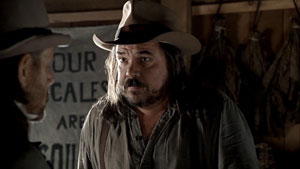 As with the first season, the make-up and costuming and cinematography for this show are fantastic, and the way the series continues to juggle such a huge cast of dynamic characters is quite impressive. There are over 20 significant characters featured in this second season, including many I have yet to mention like Sofia's (Bree Seanna Wall) rigid tutor Miss Isringhausen (Sarah Paulson), Alma's loyal claim manager Ellsworth (Jim Beaver), the uncertain Doc Cochran (Brad Dourif), Hickok's former traveling companion and Fire Commissioner/Sheriff's Deputy Charlie Utter (Dayton Callie), Bullock's business partner Sol Star (John Hawkes), the leader of the Chinese settlers on the outskirts of town Mr. Wu (Keone Young), and the deceptively devious Mayor and hotel proprietor E.B. Farnum (William Sanderson). Each of them is a richly developed character, and it is hard to imagine how they can cram so much depth into only 12 episodes.
As with the first season, the make-up and costuming and cinematography for this show are fantastic, and the way the series continues to juggle such a huge cast of dynamic characters is quite impressive. There are over 20 significant characters featured in this second season, including many I have yet to mention like Sofia's (Bree Seanna Wall) rigid tutor Miss Isringhausen (Sarah Paulson), Alma's loyal claim manager Ellsworth (Jim Beaver), the uncertain Doc Cochran (Brad Dourif), Hickok's former traveling companion and Fire Commissioner/Sheriff's Deputy Charlie Utter (Dayton Callie), Bullock's business partner Sol Star (John Hawkes), the leader of the Chinese settlers on the outskirts of town Mr. Wu (Keone Young), and the deceptively devious Mayor and hotel proprietor E.B. Farnum (William Sanderson). Each of them is a richly developed character, and it is hard to imagine how they can cram so much depth into only 12 episodes.
Unfortunately, for all my praise of this series, my criticism of the first season carries over to the second. Deadwood is one of the most impressive character studies on television, but at times, it is at the expense of interesting or coherent plot developments. At times there is so much going on in camp that it is a bit difficult to keep up, and at other times it seems as though nothing of consequence is happening anywhere. While this is often the way the world works, it does not always make for the greatest television. Whereas the first season was book-ended by brilliance with some meandering plots in the middle stretch, this second season starts off incredibly strong, carries it through the middle, and then runs out of gas in the last few episodes. I must emphasize that considering everything else, this is a very minor criticism that is only apparent because the show is so amazing in every other way.
As noted, Deadwood is about community and how even the most disparate personalities desire the same human companionship and a place they can call home. Everyone is trying to separate everyone else from their money and take advantage of one another's weaknesses, and yet there is a fundamental underlying morality to all of their actions. At the end of the day, despite how ruthless many of them try to be, they cannot fight their inner nature and their longing to be a part of something greater than themselves. Deadwood brilliantly weaves the stories of these numerous characters and their differing pursuits into compelling television, all the while expressing themselves in a lyrical and poetic method of speech unlike anything we have ever heard before, and it is an absolute joy to watch.
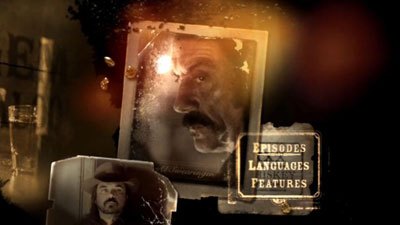
PRESENTATION:
This second season release of Deadwood is presented in essentially the same manner as the first. The 12 episodes in the set are spread across five discs with a sixth disc devoted to special features. The discs are maintained in a six-panel structure, featuring photographs from the real Deadwood, that folds up and fits neatly within a larger box. Instead of the typical slipcase model seen with most television sets, this box is designed so the front cover is hinged to the case and can be opened to reveal the discs. While it looks really beautiful, unfortunately, it is not very practical. Since most sets will stand on their side on a shelf, the loose hinging mechanism on this one could easily flop open if not flanked by other DVDs or bookends. The protruding border that annoyed me in the first season has been fixed somewhat, so it is a little more flush with the rest of the case. Finally, while the cardboard is more durable than most, it is manufactured in such a way that the combination of shipping and shrink-wrapping, or just simple use over time, will likely render many of these cases torn. I hate to complain about the nice artistic result, but it simply is not a practical packaging solution for the average viewer, and just once, I want to receive an HBO set like this that is not easily damaged in the mail.
The menus are designed with impressive animated backgrounds, and the episodes are structured on the discs in a way that you can easily navigate through the "Previously On" and "Next On" portions of the show if you desire. One minor annoyance is that navigating through the audio commentaries can be a bit cumbersome, as the DVD does not assume that you would like to listen to the audio commentaries one after another, so you have to navigate through the menus for each one, which can be a pain.
As always with HBO releases, the audio and video quality are exceptional. In fact, this may be the best video presentation I've seen on a television release to date. The video is presented in 16x9 anamorphic widescreen, and for a show with such a dark palette and so much movement between poorly lit indoor scenes and bright outdoor sequences, it looks amazing. I tried to find something wrong with it, so I could write about it in this review, but it just looks too good.
The audio is more of the same. Included on the set is a 5.1 Dolby Digital English track as well as 2.0 Surround tracks for English, French, and Spanish. The 5.1 mix is clean and clear with good use of the surround channels, and the dialogue is balanced nicely with the music and limited effects. While nothing about the audio jumps out as being particularly impressive, it is more than adequate, and I have zero complaints.
Of note, subtitles are included for the episodes in English, French, and Spanish.
WHISTLES & BELLS:
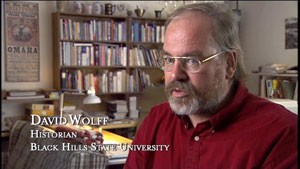 For an HBO release, there are a considerable amount of special features to be found on this set. On the bonus disc, there are four featurettes, and each of them is very interesting. The Real Deadwood 1877 - Historical Featurette (21:25) is a continuation of a similar featurette from the first season release. Blending interviews with experts on Deadwood's real history and the creators of the show, it focuses on some of the elements specific to this season, such as the larger focus on the Chinese immigrants and the role of women in the camp. It is both informative and interesting, and I really hope to see more of these in the future.
For an HBO release, there are a considerable amount of special features to be found on this set. On the bonus disc, there are four featurettes, and each of them is very interesting. The Real Deadwood 1877 - Historical Featurette (21:25) is a continuation of a similar featurette from the first season release. Blending interviews with experts on Deadwood's real history and the creators of the show, it focuses on some of the elements specific to this season, such as the larger focus on the Chinese immigrants and the role of women in the camp. It is both informative and interesting, and I really hope to see more of these in the future.
The remaining three featurettes appear under the heading Making of Episode 12, "Boy-the-Earth-Talks-To". Trusting the Process with David Milch (27:19) is a fascinating look at how the show's creator goes about writing the dialogue for a scene and all the little tweaks he makes while on the set. Particularly interesting is how he writes in public, lying on the floor and dictating to someone at a computer while a crowd of people observes the process on a monitor. Mr. Wu Proves Out (21:47) covers the culmination of the subplot with the Chinese and Swearengen's involvement, and The Wedding Celebration (21:31) details the blocking and choreography involved in setting up a wedding that occurs in the season finale.
Additionally, there are a staggering nine!! Audio Commentaries, which seems like overkill but has enough variety to be a wonderful part of the set. On the season premiere, "A Lie Agreed Upon, Part I", there are two commentaries, one with Timothy Olyphant (Seth Bullock) and Ian McShane (Al Swearengen), and another with Molly Parker (Alma Garret) and Anna Gunn (Martha Bullock). Olyphant and McShane were together on the finale for the first season, and it was a hilarious and indescribable piece of audio, so I was really curious to hear what would happen when they were paired together again. Predictably, the entire thing is hilarious once more, and while they don't really talk that much about the show itself, I could listen to them exchange banter with one another for hours. Warning: There is a very minor spoiler about the 3rd Season in this commentary. The second commentary with Parker and Gunn has a completely different tone, with more reverence and analysis for the show, but it is quite informative and equally enjoyable in its own way.
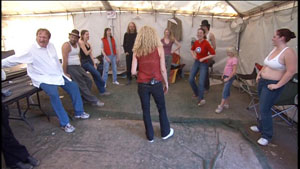 David Milch -- creator, head writer, executive producer, and overall man-in-charge -- provides commentary for the third episode of the season, "New Money", and like his effort on the first season, this one is not particularly engrossing. In his interviews, he speaks to eloquently about the show, and he shares so much insight, but it doesn't translate well in these commentaries. Fellow executive producer and director Gregg Fienberg finds more success in this area on the fifth episode, "Complications (Formerly 'Difficulties')". His approach is works better, and he provides the kind of behind-the-scenes insight we want from a director/producer commentary.
David Milch -- creator, head writer, executive producer, and overall man-in-charge -- provides commentary for the third episode of the season, "New Money", and like his effort on the first season, this one is not particularly engrossing. In his interviews, he speaks to eloquently about the show, and he shares so much insight, but it doesn't translate well in these commentaries. Fellow executive producer and director Gregg Fienberg finds more success in this area on the fifth episode, "Complications (Formerly 'Difficulties')". His approach is works better, and he provides the kind of behind-the-scenes insight we want from a director/producer commentary.
On "E.B. Was Left Out", there are two more audio tracks, this time one with Kim Dickens (Joanie Stubbs), William Sanderson (E.B. Farnum), and Dayton Callie (Charlie Utter) and another with Powers Boothe (Cy Tolliver) and Garret Dillahunt (Francis Wolcott). While all of these people seem to enjoy their show and have a fun time talking about it, neither of these commentaries is as insightful as the one with Parker and Gunn or as entertaining as Olyphant and McShane. If you are a huge fan of the show, you might enjoy listening to them, but if you are looking to pick and choose from the nine on the set, I would recommend passing on these.
John Hawkes (Sol Star) and Paula Malcomson (Trixie) are on hand for episode 10, "Advances, None Miraculous", and it is surprisingly good. Whereas the previous two commentaries are haphazard joking around with some moments of silence, Hawkes and Malcomson really have a lot to share about their experience on the show, and they work quite well together. Finally, on the penultimate episode, "The Whores Can Come", the last two commentaries feature one with Timothy Olyphant, this time paired with Anna Gunn, and another with Ian McShane, this time paired with Paula Malcomson. Olyphant and Gunn together present a nice blend of the first two commentaries, with some good sincere information and a lot of entertaining joking around. Gunn isn't as a good a comedy partner for Olyphant as McShane is, and a lot of time is filled by her laughing at his jokes, but it is still a decent listen. The McShane/Malcomson pairing is essentially more of the same, with some informative material and a lot of laughter, except with a lot more dead time. If you had to pick another one to bypass, this would be a good candidate.
Lastly, there is a photo gallery under the title Deadwood Daguerreotypes: Photo Gallery of Characters and Historic Deadwood. As its name indicates, it is a set of 31 photos (15 from historical deadwood, 16 promotional shots for the show), navigated by the arrow keys on your remote.
CONCLUDING THOUGHTS:
Deadwood is yet another in a growing list of brilliant HBO series, and this second season impressively takes the great work from the first and actually improves upon it. There are more characters, more subtext, and more drama, and it all blends together incredibly well; and while it can sometimes seem overwhelming to keep track of it all, it is almost always entertaining. With its richly dynamic characters and their beautifully poetic dialogue, there really is nothing like this show on television or in theaters, and although it sometimes stumbles in the area of dramatic storytelling, it never fails as a morality tale or a study in the human condition. I must be clear that this is a very adult show, and if you are offended by raw obscenities, both spoken and visualized, this might not be the show for you, but if you at all enjoyed the first season, you are likely to find even more enjoyment from this second effort, with a strong slate of special features to boot. Highly Recommended.
|
| Popular Reviews |
| Sponsored Links |
|
|
| Sponsored Links |
|
|
| Release List | Reviews | Shop | Newsletter | Forum | DVD Giveaways | Blu-Ray | Advertise |
|
Copyright 2024 DVDTalk.com All Rights Reserved. Legal Info, Privacy Policy, Terms of Use,
Manage Preferences,
Your Privacy Choices | |||||||













